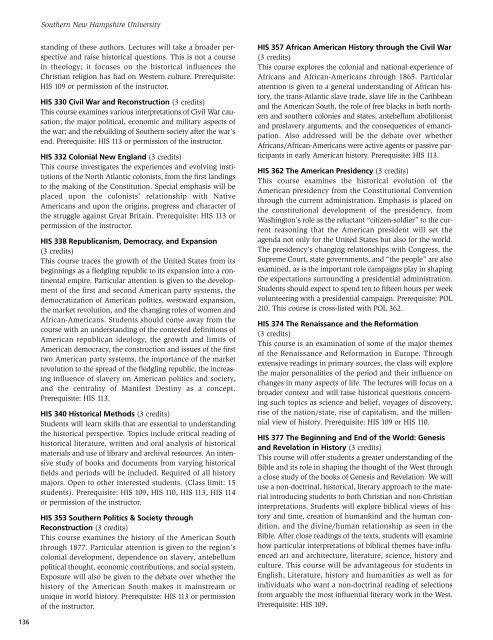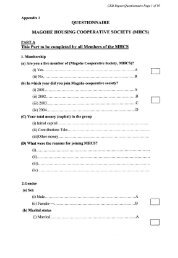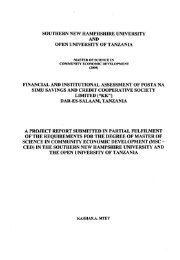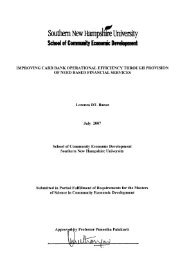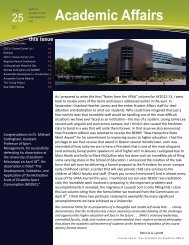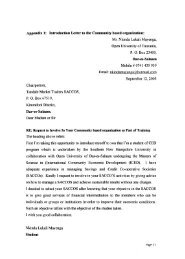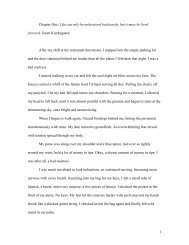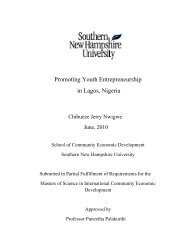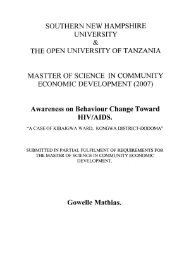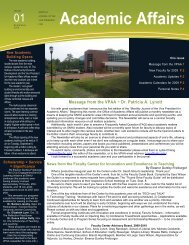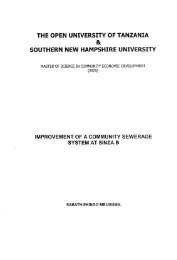Undergraduate Catalog 2010-2011 - SNHU Academic Archive ...
Undergraduate Catalog 2010-2011 - SNHU Academic Archive ...
Undergraduate Catalog 2010-2011 - SNHU Academic Archive ...
You also want an ePaper? Increase the reach of your titles
YUMPU automatically turns print PDFs into web optimized ePapers that Google loves.
Southern New Hampshire University<br />
standing of these authors. Lectures will take a broader perspective<br />
and raise historical questions. This is not a course<br />
in theology; it focuses on the historical influences the<br />
Christian religion has had on Western culture. Prerequisite:<br />
HIS 109 or permission of the instructor.<br />
HIS 330 Civil War and Reconstruction (3 credits)<br />
This course examines various interpretations of Civil War causation;<br />
the major political, economic and military aspects of<br />
the war; and the rebuilding of Southern society after the war’s<br />
end. Prerequisite: HIS 113 or permission of the instructor.<br />
HIS 332 Colonial New England (3 credits)<br />
This course investigates the experiences and evolving institutions<br />
of the North Atlantic colonists, from the first landings<br />
to the making of the Constitution. Special emphasis will be<br />
placed upon the colonists’ relationship with Native<br />
Americans and upon the origins, progress and character of<br />
the struggle against Great Britain. Prerequisite: HIS 113 or<br />
permission of the instructor.<br />
HIS 338 Republicanism, Democracy, and Expansion<br />
(3 credits)<br />
This course traces the growth of the United States from its<br />
beginnings as a fledgling republic to its expansion into a continental<br />
empire. Particular attention is given to the development<br />
of the first and second American party systems, the<br />
democratization of American politics, westward expansion,<br />
the market revolution, and the changing roles of women and<br />
African-Americans. Students should come away from the<br />
course with an understanding of the contested definitions of<br />
American republican ideology, the growth and limits of<br />
American democracy, the construction and issues of the first<br />
two American party systems, the importance of the market<br />
revolution to the spread of the fledgling republic, the increasing<br />
influence of slavery on American politics and society,<br />
and the centrality of Manifest Destiny as a concept.<br />
Prerequisite: HIS 113.<br />
HIS 340 Historical Methods (3 credits)<br />
Students will learn skills that are essential to understanding<br />
the historical perspective. Topics include critical reading of<br />
historical literature, written and oral analysis of historical<br />
materials and use of library and archival resources. An intensive<br />
study of books and documents from varying historical<br />
fields and periods will be included. Required of all history<br />
majors. Open to other interested students. (Class limit: 15<br />
students). Prerequisite: HIS 109, HIS 110, HIS 113, HIS 114<br />
or permission of the instructor.<br />
HIS 353 Southern Politics & Society through<br />
Reconstruction (3 credits)<br />
This course examines the history of the American South<br />
through 1877. Particular attention is given to the region’s<br />
colonial development, dependence on slavery, antebellum<br />
political thought, economic contributions, and social system.<br />
Exposure will also be given to the debate over whether the<br />
history of the American South makes it mainstream or<br />
unique in world history. Prerequisite: HIS 113 or permission<br />
of the instructor.<br />
HIS 357 African American History through the Civil War<br />
(3 credits)<br />
This course explores the colonial and national experience of<br />
Africans and African-Americans through 1865. Particular<br />
attention is given to a general understanding of African history,<br />
the trans-Atlantic slave trade, slave life in the Caribbean<br />
and the American South, the role of free blacks in both northern<br />
and southern colonies and states, antebellum abolitionist<br />
and proslavery arguments, and the consequences of emancipation.<br />
Also addressed will be the debate over whether<br />
Africans/African-Americans were active agents or passive participants<br />
in early American history. Prerequisite: HIS 113.<br />
HIS 362 The American Presidency (3 credits)<br />
This course examines the historical evolution of the<br />
American presidency from the Constitutional Convention<br />
through the current administration. Emphasis is placed on<br />
the constitutional development of the presidency, from<br />
Washington’s role as the reluctant “citizen-soldier” to the current<br />
reasoning that the American president will set the<br />
agenda not only for the United States but also for the world.<br />
The presidency’s changing relationships with Congress, the<br />
Supreme Court, state governments, and “the people” are also<br />
examined, as is the important role campaigns play in shaping<br />
the expectations surrounding a presidential administration.<br />
Students should expect to spend ten to fifteen hours per week<br />
volunteering with a presidential campaign. Prerequisite: POL<br />
210. This course is cross-listed with POL 362.<br />
HIS 374 The Renaissance and the Reformation<br />
(3 credits)<br />
This course is an examination of some of the major themes<br />
of the Renaissance and Reformation in Europe. Through<br />
extensive readings in primary sources, the class will explore<br />
the major personalities of the period and their influence on<br />
changes in many aspects of life. The lectures will focus on a<br />
broader context and will raise historical questions concerning<br />
such topics as science and belief, voyages of discovery,<br />
rise of the nation/state, rise of capitalism, and the millennial<br />
view of history. Prerequisite: HIS 109 or HIS 110.<br />
HIS 377 The Beginning and End of the World: Genesis<br />
and Revelation in History (3 credits)<br />
This course will offer students a greater understanding of the<br />
Bible and its role in shaping the thought of the West through<br />
a close study of the books of Genesis and Revelation. We will<br />
use a non-doctrinal, historical, literary approach to the material<br />
introducing students to both Christian and non-Christian<br />
interpretations. Students will explore biblical views of history<br />
and time, creation of humankind and the human condition,<br />
and the divine/human relationship as seen in the<br />
Bible. After close readings of the texts, students will examine<br />
how particular interpretations of biblical themes have influenced<br />
art and architecture, literature, science, history and<br />
culture. This course will be advantageous for students in<br />
English, Literature, history and humanities as well as for<br />
individuals who want a non-doctrinal reading of selections<br />
from arguably the most influential literary work in the West.<br />
Prerequisite: HIS 109.<br />
136


